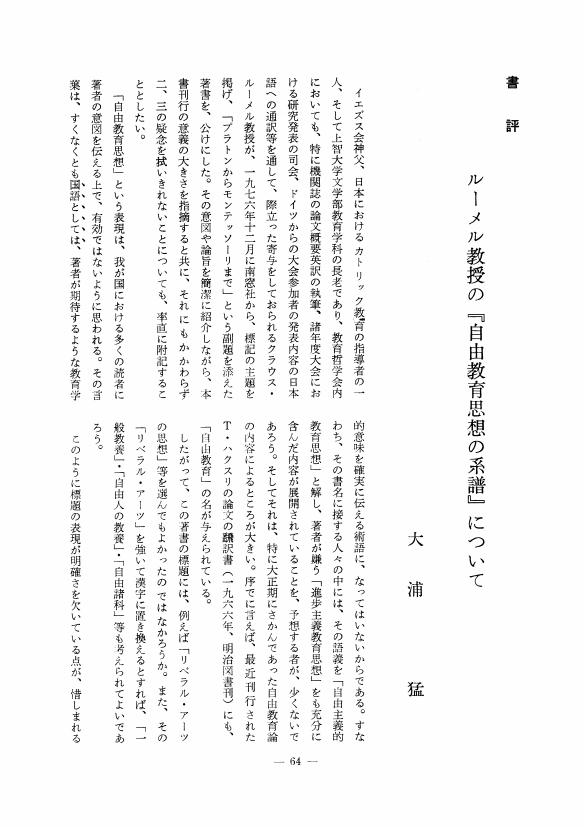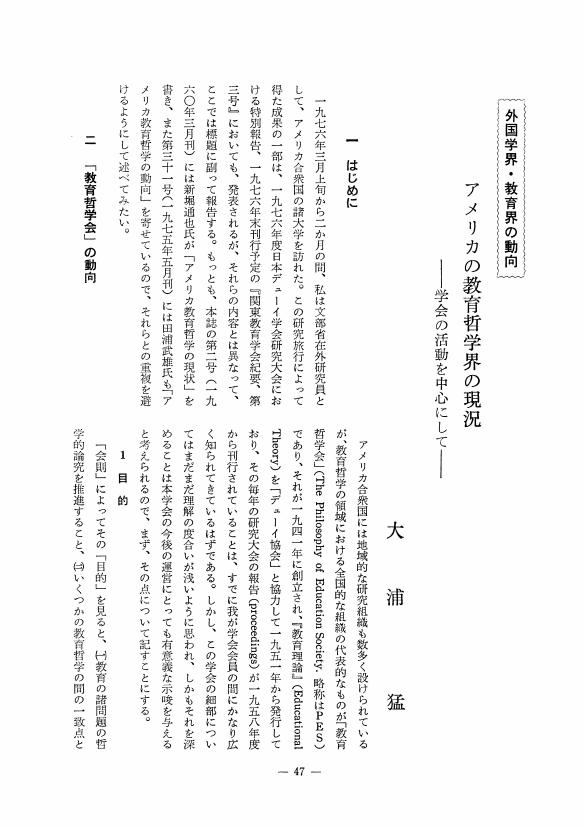3 0 0 0 OA 矢川徳光著『マルクス主義教育学試論』 その補論「心理学的認識と教育学的認識」をあわせて
- 著者
- 大浦 猛
- 出版者
- 一般社団法人 日本教育学会
- 雑誌
- 教育学研究 (ISSN:03873161)
- 巻号頁・発行日
- vol.39, no.3, pp.244-246, 1972-09-30 (Released:2009-01-13)
1 0 0 0 OA 教育・研究の分野としての教育哲学の成立過程と課題
- 著者
- 大浦 猛
- 出版者
- 教育哲学会
- 雑誌
- 教育哲学研究 (ISSN:03873153)
- 巻号頁・発行日
- vol.1993, no.67, pp.100-112, 1993-05-10 (Released:2010-01-22)
- 参考文献数
- 25
1 0 0 0 OA 東岸克好著『ペスタロッチの直観教育思想の研究』
- 著者
- 大浦 猛
- 出版者
- 教育哲学会
- 雑誌
- 教育哲学研究 (ISSN:03873153)
- 巻号頁・発行日
- vol.1980, no.42, pp.94-99, 1980-11-25 (Released:2009-09-04)
1 0 0 0 OA ルーメル教授の『自由教育思想の系譜』について
- 著者
- 大浦 猛
- 出版者
- 教育哲学会
- 雑誌
- 教育哲学研究 (ISSN:03873153)
- 巻号頁・発行日
- vol.1977, no.36, pp.64-69, 1977 (Released:2009-09-04)
1 0 0 0 OA アメリカの教育哲学界の現況 学会の活動を中心にして
- 著者
- 大浦 猛
- 出版者
- 教育哲学会
- 雑誌
- 教育哲学研究 (ISSN:03873153)
- 巻号頁・発行日
- vol.1976, no.34, pp.47-53, 1976-10-10 (Released:2009-09-04)
1 0 0 0 OA 篠原助市における教育学形成の特質 欧米教育思想攝取の態度を中心にして
- 著者
- 大浦 猛
- 出版者
- 教育哲学会
- 雑誌
- 教育哲学研究 (ISSN:03873153)
- 巻号頁・発行日
- vol.1975, no.31, pp.1-7, 1975-05-20 (Released:2009-09-04)
- 参考文献数
- 3
1 0 0 0 OA 教育哲学の課題 現代教育の課題と関連させて
- 著者
- 大浦 猛
- 出版者
- 教育哲学会
- 雑誌
- 教育哲学研究 (ISSN:03873153)
- 巻号頁・発行日
- vol.1974, no.29, pp.6-12, 1974-05-15 (Released:2009-09-04)
- 著者
- 大浦 猛
- 出版者
- 教育哲学会
- 雑誌
- 教育哲学研究 (ISSN:03873153)
- 巻号頁・発行日
- vol.1964, no.10, pp.1-25, 1964 (Released:2009-09-04)
- 参考文献数
- 48
The serious study of Dilthey's educational thought in Japan began in the early twenties. It was closely connected with the philosophy of human education, which was popular in the preceding decade, and with research on the educational thought of the neo-Kantians, which was avidly carried on from around 1917 to 1922. From the mid-twenties to the end of the decade it formed a popular current of thought known as bunka kyoikugaku, cultural pedagogy, within which special attention was devoted to Spranger's version. Since, however, it was not systematically formulated; since influences from the politicization of educational thought within Germany were beginning to be felt ; since, finally, nationalism was rising within Japan, subtle differences of opinion concerning the position of Dilthey came to the fore in Japan in the thirties. With the opening of the Pacific War, Dilthey's thought began to lose its position of esteem among Japanese thinkers.






